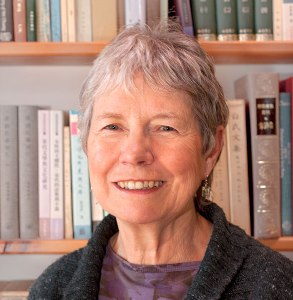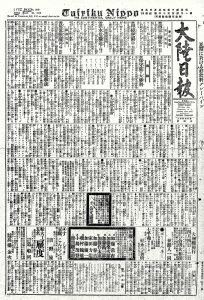
Within the context of the changing environment, librarians work alongside and provide support to faculty, students and community members on their research endeavours. Featured in this section are memories and testimonials from users describing how the Asian Library’s collections and services have supported and advanced their research, learning and teaching. Thank you for sharing!
 “The Asian Library’s recent collection of Tibetan language books are an excellent resource for my students in both spoken and classical Tibetan courses. South Asian and Himalayan Studies librarian Sarbjit Randhawa took my class in the past, and we worked together to select the current collection. Sarbjit also visited my class to introduce the current resources to the students. I am hopeful that the student interest in Tibetan and Himalayan studies will grow over the years to come, and the Asian Library’s existing collection will be an essential resource for the students.”
“The Asian Library’s recent collection of Tibetan language books are an excellent resource for my students in both spoken and classical Tibetan courses. South Asian and Himalayan Studies librarian Sarbjit Randhawa took my class in the past, and we worked together to select the current collection. Sarbjit also visited my class to introduce the current resources to the students. I am hopeful that the student interest in Tibetan and Himalayan studies will grow over the years to come, and the Asian Library’s existing collection will be an essential resource for the students.”
Sonam Chusang
Adjunct Professor, Tibetan, Department of Asian Studies
 “As a postdoc focusing on Chinese diplomacy and East Asia International Relations, UBC Asian Library’s collections and services have been vital to my research. Especially given the COVID-19 outbreak, Asia Library’s expanding collection of online databases deserves recognition. One of my favorite resources is the online People’s Daily News Archive, which allows me to do content analysis using digitized news wires. Another important resource I rely on is the Asian Library’s growing collection on news archives and databases on North Korea. Given the dearth of publicized data on North Korea, UBC’s North Korea collection is truly a gem. Finally, my favorite part of the library are the dedicated and ever-helpful librarians! Sae Yong Kim is the Korean Studies Librarian, and I am grateful to her for her support in tracking down hard-to-find data on North Korea that I needed for my research. UBC’s Asian Library is a superb institution fueled by extraordinary librarians whose efforts at making this library accessible, useful and inspiring to scholars at UBC!”
“As a postdoc focusing on Chinese diplomacy and East Asia International Relations, UBC Asian Library’s collections and services have been vital to my research. Especially given the COVID-19 outbreak, Asia Library’s expanding collection of online databases deserves recognition. One of my favorite resources is the online People’s Daily News Archive, which allows me to do content analysis using digitized news wires. Another important resource I rely on is the Asian Library’s growing collection on news archives and databases on North Korea. Given the dearth of publicized data on North Korea, UBC’s North Korea collection is truly a gem. Finally, my favorite part of the library are the dedicated and ever-helpful librarians! Sae Yong Kim is the Korean Studies Librarian, and I am grateful to her for her support in tracking down hard-to-find data on North Korea that I needed for my research. UBC’s Asian Library is a superb institution fueled by extraordinary librarians whose efforts at making this library accessible, useful and inspiring to scholars at UBC!”
Jeehye Kim
Postdoctoral Fellow, Department of Political Science
 “During my sixteen years of working at UBC, the Asian Library and its expert staff have fostered research discoveries; provided skills, training, and resources; and created opportunities for collaboration among students, faculty, librarians, visiting scholars, and communities of readers. I have had the privilege of hosting seminars in the Library, working to build our collections, and sharing with learners both within and beyond our university some of the treasures we hold.”
“During my sixteen years of working at UBC, the Asian Library and its expert staff have fostered research discoveries; provided skills, training, and resources; and created opportunities for collaboration among students, faculty, librarians, visiting scholars, and communities of readers. I have had the privilege of hosting seminars in the Library, working to build our collections, and sharing with learners both within and beyond our university some of the treasures we hold.”
Christina Laffin
Associate Professor, Classical Japanese, Department of Asian Studies
 “I have had the privilege of coming to the Asian Library for the past twenty years as both a student and a lecturer. Its collections, staff, and services have played a vital role in my learning, research, and teaching. When I first came to UBC as an undergraduate student, I was amazed to see the wide range of books in South Asian languages, specifically Punjabi and Hindi. These books enabled me to quench my thirst for literature, specifically poetry, and allowed me to perfect my language skills. Following undergraduate studies, I was fortunate enough to pursue graduate studies in Asian Studies at UBC, where the unique collections of Punjabi played a fundamental role in my research, as I prepared my thesis.
“I have had the privilege of coming to the Asian Library for the past twenty years as both a student and a lecturer. Its collections, staff, and services have played a vital role in my learning, research, and teaching. When I first came to UBC as an undergraduate student, I was amazed to see the wide range of books in South Asian languages, specifically Punjabi and Hindi. These books enabled me to quench my thirst for literature, specifically poetry, and allowed me to perfect my language skills. Following undergraduate studies, I was fortunate enough to pursue graduate studies in Asian Studies at UBC, where the unique collections of Punjabi played a fundamental role in my research, as I prepared my thesis.
Eventually, my academic journey in Asian Studies led me to a faculty position in the Department where once again, I relied on the collections and services of the Asian Library; this time when it came to teaching and preparing curriculum, and also, for supporting my students in conducting their research. We are fortunate to have outstanding librarians and library support staff, who are highly knowledgeable and always there to assist students and faculty. I am grateful that we have an excellent library that offers such fine collections and services, which help thousands of individuals in attaining their research, learning, and teaching goals.”
Gurinder Mann
Lecturer, Punjabi Language and Culture, Department of Asian Studies
 “Congratulations on the 60th anniversary of the founding of the Asian Library at UBC, a birthdate shared with its twin, the Department of Asian Studies!
“Congratulations on the 60th anniversary of the founding of the Asian Library at UBC, a birthdate shared with its twin, the Department of Asian Studies!
I have benefited from the enthusiastic assistance and support of successive Japanese Studies Librarians, starting with Mr. Gonnami, who started building the collection in premodern Japanese literature—especially poetry—and art as soon as I was hired. Over the years the Librarians have often anticipated my needs, allowing me to find on our shelves books I only recently realized I needed.
Under Shirin Eshghi Furuzawa and Tomoko Kitayama Yen, on one hand our electronic resources have expanded considerably, while on the other hand there has been a concerted effort to add to our rare book holdings. Both these initiatives benefit not only faculty research but also teaching, and I am very much looking forward to being able to bring students back to Rare Books and Special Collections to examine the many important works that have been recently added.”
Joshua Mostow
Professor, Pre-Modern Japanese Literature and Art, Department of Asian Studies
 “The UBC Asian Library has been essential to my research since I first arrived at UBC in 2008. Thanks to the acquisitions efforts of librarian Jing Liu and directors Eleanor Yuen and Shirin Eshghi Furuzawa, the Library boasts physical and digital collections that routinely save researchers thousands of dollars and countless days that would otherwise be required for travel to libraries abroad.
“The UBC Asian Library has been essential to my research since I first arrived at UBC in 2008. Thanks to the acquisitions efforts of librarian Jing Liu and directors Eleanor Yuen and Shirin Eshghi Furuzawa, the Library boasts physical and digital collections that routinely save researchers thousands of dollars and countless days that would otherwise be required for travel to libraries abroad.
Manuscripts of Qian Zhongshu 錢鍾書手稿集, comprising over 70 volumes of facsimile notebooks, for example, enabled me to identify several Western-language sources that inspired that major writer’s creative works. This fantastic discovery led to my presentation at a 2018 conference at Peking University, a forthcoming article, and this video lecture in which I show excerpts from Qian’s writings at Oxford.
The Shun Pao 申報 and Late Qing Dynasty & Minguo Periodical Fulltext Database 晚清民國期刊全文數據庫 (1833-1949) are just two of the digital resources that I have used extensively in my research and teaching. They were crucial primary sources of information, for example, on the release and reception of early Chinese films, which I used both for my forthcoming book Chinese Film Classics, 1922-1949 and for the 24 video lectures for an open-access course on the Modern Chinese Cultural Studies YouTube channel and ChineseFilmClassics.org. With just these two projects, Asian Library resources have made new research available to thousands of people around the world.”
Christopher Rea
Professor, Modern Chinese Literature, Department of Asian Studies
 “As a historian of imperial China and Convenor of the UBC Hong Kong Studies Initiative, I have always thought of the Asian Library as a “comrade in arms” in both the creation and dissemination of knowledge concerning the Chinese-speaking world. Although we have become increasingly used to conducting research (and, now, teaching) online, I still consider a well-designed space surrounded by expertly-curated books and resources the epicenter of the intellectual life of a university. I have benefitted, perhaps without knowing then, from spending many an evening strolling through the aisles, browsing the seemingly random titles on the shelves, of one such library when I myself was a student. And I have no doubt, even as the landscape for learning evolves, researchers, students, and community members will continue to be inspired by the world-class services and resources—the Puban and the Siku collections come immediately to mind—of the UBC Asian Library.”
“As a historian of imperial China and Convenor of the UBC Hong Kong Studies Initiative, I have always thought of the Asian Library as a “comrade in arms” in both the creation and dissemination of knowledge concerning the Chinese-speaking world. Although we have become increasingly used to conducting research (and, now, teaching) online, I still consider a well-designed space surrounded by expertly-curated books and resources the epicenter of the intellectual life of a university. I have benefitted, perhaps without knowing then, from spending many an evening strolling through the aisles, browsing the seemingly random titles on the shelves, of one such library when I myself was a student. And I have no doubt, even as the landscape for learning evolves, researchers, students, and community members will continue to be inspired by the world-class services and resources—the Puban and the Siku collections come immediately to mind—of the UBC Asian Library.”
Leo K. Shin
Associate Professor, Chinese History, Department of History and Asian Studies
Convenor, Hong Kong Studies Initiative
 “The Asian library plays a hugely important role at UBC. It is a repository of key resources from Asian countries recognized as one of the best in the world. This includes government reports, publications, monographs, literature, and ancient documents. Over the years, the library staff has been hugely helpful for my classes, my research, my graduate students and post-doc fellows. Often, library staff has prepared special research tools for my class in Japanese politics. Over recent years, the library has acquired extremely valuable and important online resources that are proving invaluable for teaching and research. Given the importance of Asia teaching and research at UBC, the Asian Library is a guarantor of UBC’s top competitive advantage as a university of the Asia-Pacific.”
“The Asian library plays a hugely important role at UBC. It is a repository of key resources from Asian countries recognized as one of the best in the world. This includes government reports, publications, monographs, literature, and ancient documents. Over the years, the library staff has been hugely helpful for my classes, my research, my graduate students and post-doc fellows. Often, library staff has prepared special research tools for my class in Japanese politics. Over recent years, the library has acquired extremely valuable and important online resources that are proving invaluable for teaching and research. Given the importance of Asia teaching and research at UBC, the Asian Library is a guarantor of UBC’s top competitive advantage as a university of the Asia-Pacific.”
Yves Tiberghien
Professor, Department of Political Science
Co-Director, Centre for Japanese Research
Distinguished Fellow, Asia Pacific Foundation of Canada
 “I owe my life as a scholar to the existence of the UBC Asian Studies Library. Without the library, there would have been no department of Asian Studies, at least not one that could support graduate research and attract excellent scholars. Without the department, I would not have been able in the academic year of 1965-66 as a fourth-year student to take the course on Japanese literature from Prof. Shūichi Katō that inspired me to devote myself to studying Japanese and Chinese in order to translate the poems written in literary Chinese by the Japanese Zen monk Ikkyū Sōjun (1394-1481). I still remember the thrill of filling out my first request slip for a book in Japanese. In those days, all books were fetched from the stacks by pages. I was requesting a copy of the Kokin wakashū 古今和歌集. I had only started studying Japanese three months previous with Prof. Matsuo Soga so tracing out the characters required effort, and reading the book even more effort, but what a world it opened! I pursued graduate work at UBC from 1967 to 1979. My second thrilling library experience was when a Qing dynasty thread-stitched volume from the Puban Collection was put in my hands because it contained a primary text of Chinese Buddhism that I needed to consult for my dissertation on Ikkyū. The rarity of that volume, the history embodied in its material existence still moves me to awe. Throughout the twelve years of my graduate work, either every book I needed was in the Asian Studies library or it was acquired. The librarians Tsuneharu Gonnami and Yim Tse were unfailingly helpful! I only realized how fortunate I had been when I took up my first university post at the University of Alberta and discovered that the library had pitiful resources in Chinese and Japanese materials and no dedicated Asian language librarian. Nonetheless, the experience of having had access to such a fine library enabled me to assist the University of Alberta library to begin the slow process of building a collection that could sustain research. During those years, I still came every summer to UBC to use the library. The debt of gratitude I owe the Asian Studies Library knows no bounds. I extend my best wishes to the current staff who are working to maintain its excellence.”
“I owe my life as a scholar to the existence of the UBC Asian Studies Library. Without the library, there would have been no department of Asian Studies, at least not one that could support graduate research and attract excellent scholars. Without the department, I would not have been able in the academic year of 1965-66 as a fourth-year student to take the course on Japanese literature from Prof. Shūichi Katō that inspired me to devote myself to studying Japanese and Chinese in order to translate the poems written in literary Chinese by the Japanese Zen monk Ikkyū Sōjun (1394-1481). I still remember the thrill of filling out my first request slip for a book in Japanese. In those days, all books were fetched from the stacks by pages. I was requesting a copy of the Kokin wakashū 古今和歌集. I had only started studying Japanese three months previous with Prof. Matsuo Soga so tracing out the characters required effort, and reading the book even more effort, but what a world it opened! I pursued graduate work at UBC from 1967 to 1979. My second thrilling library experience was when a Qing dynasty thread-stitched volume from the Puban Collection was put in my hands because it contained a primary text of Chinese Buddhism that I needed to consult for my dissertation on Ikkyū. The rarity of that volume, the history embodied in its material existence still moves me to awe. Throughout the twelve years of my graduate work, either every book I needed was in the Asian Studies library or it was acquired. The librarians Tsuneharu Gonnami and Yim Tse were unfailingly helpful! I only realized how fortunate I had been when I took up my first university post at the University of Alberta and discovered that the library had pitiful resources in Chinese and Japanese materials and no dedicated Asian language librarian. Nonetheless, the experience of having had access to such a fine library enabled me to assist the University of Alberta library to begin the slow process of building a collection that could sustain research. During those years, I still came every summer to UBC to use the library. The debt of gratitude I owe the Asian Studies Library knows no bounds. I extend my best wishes to the current staff who are working to maintain its excellence.”
Sonja Arntzen
Professor Emerita, Department of East Asian Studies, University of Toronto
UBC Alumnus, Department of Asian Studies
“Asian Library is not only my workplace, it also provided invaluable resources for my projects. When I was involved in a translation project on classical Chinese garden about 18 years ago, I found great books in the Library that helped me understand the key elements of garden design. A few years later, I had opportunity to participate in a research project on the historical society buildings in Vancouver Chinatown. The Asian Library’s collection of qiaokan 僑刊 as well as publications from local clan associations gave me plenty of information, in which some of them are primary resources. The fascinating materials on overseas Chinese studies also played an important role in my research when I assisted in organizing the exhibition of historical artifacts of the Ing clan in 2014.”
Phoebe S.L. Chow
Program Services Assistant, Asian Library

Tairiku Nippō (Continental Daily News)
“The collections and services available at the Asian Library have most positively influenced my research and learning experience at UBC during my graduate program in Educational Studies. At the beginning of my program, I had the chance to meet with the Japanese subject librarian for guidance on resources related to (im)migrants from Japan. They recommended several resources and took the time to carefully listen to my research interests. I came out of the meeting not only with a list of articles and call numbers, but also with motivation and encouragement to pursue a historical research project.
For my graduate thesis, I used both print and digitized materials–particularly those regarding the history of people of Japanese descent in the early twentieth century. These included print resources from the Japanese Canadian Research Collection accessible at the Rare Books and Special Collections and the digitized Japanese language newspaper called the Tairiku Nippō.
I am very grateful for the resources that are carefully kept at the Asian Library. To the librarians and staff: thank you so much for supporting and guiding us in our research endeavors and learning experiences at UBC!”
Haruho Kubota
MA, Department of Educational Studies
 “Back in 2012, I had the opportunity to be involved in the book project, Qupai in Chinese Music: Melodic Models in Form and Practice (Routledge, 2016) initiated by my mentor, ethnomusicologist Dr. Alan Thrasher, both as an assistant editor and a contributor. As I was tackling the complex interactions between music, language, and literary forms as manifested in traditional Kunqu 崑曲 opera, the wealth of music-related materials at the Asian Library – the largest collection in Western Canada – from linguistic references to classic texts and multi-volume anthologies, in printed, audio-visual, and digital/online formats, proved to be indispensable to my research.
“Back in 2012, I had the opportunity to be involved in the book project, Qupai in Chinese Music: Melodic Models in Form and Practice (Routledge, 2016) initiated by my mentor, ethnomusicologist Dr. Alan Thrasher, both as an assistant editor and a contributor. As I was tackling the complex interactions between music, language, and literary forms as manifested in traditional Kunqu 崑曲 opera, the wealth of music-related materials at the Asian Library – the largest collection in Western Canada – from linguistic references to classic texts and multi-volume anthologies, in printed, audio-visual, and digital/online formats, proved to be indispensable to my research.
Most memorable, however, was the tremendous help and support from the library staff, at a time when I was residing mostly in the city of Fort St. John in northeastern BC and could only visit the Asian Library a few times every year. Despite the geographical distance, I obtained some crucial information regarding early 20th-century Chinese copyright regulations from Chinese Librarian Jing Liu. It took former Korean Librarian Lucia Park a mere 10 minutes to search for a digital version of the 16th-century Siyung Hyang’akpu 시용 향악보/時用鄉樂譜 through a Korean database (which I would not have been able to do otherwise), and it was Cataloguer Ya Min Wu who identified a rare 18th-century edition of the Southern Song-dynasty Baishi Daoren Gequ 白石道人歌曲 from the Puban Collection and guided me through the image permissions process. Last but not least, there was the exceptional circulation support from Shaun Wang and Phoebe Chow in resolving any technical difficulties, and receiving and discharging the books I returned from the north through the mail – all at a time when I was supposed to be physically and spiritually most remote from Chinese music and Asia – a wonderful journey only made possible by the Asian Library.”
Alan Lau
Resident Composer, Vancouver Chinese Music Ensemble
UBC Alumnus, School of Music
“Thanks to the Asian Library, I can enjoy Japanese novels more often than when I was in Japan. Asian Library provided me opportunities to explore “classic novels” which I was not interested in before.”
 “The Asian Library has played an integral role in my research and learning – both as an undergraduate and now as a graduate student at UBC. The Library’s extensive archives have been an indispensable resource for my research in particular. As a student of Ming Dynasty history, I regularly rely on access to primary sources when conducting my research – including locally-produced gazetteers, statesmen’s political memoirs, and official dynastic histories. The Asian Library’s voluminous and diverse collection of primary sources from the Ming, indeed, has made the process of undertaking research such a delight!
“The Asian Library has played an integral role in my research and learning – both as an undergraduate and now as a graduate student at UBC. The Library’s extensive archives have been an indispensable resource for my research in particular. As a student of Ming Dynasty history, I regularly rely on access to primary sources when conducting my research – including locally-produced gazetteers, statesmen’s political memoirs, and official dynastic histories. The Asian Library’s voluminous and diverse collection of primary sources from the Ming, indeed, has made the process of undertaking research such a delight!
I would be remiss to not mention the staff at the Asian Library, who have been extraordinarily supportive throughout my years at UBC. They have generously dedicated their time and energy to searching out obscure documents for me and making databases available, thereby facilitating my thesis research and other academic endeavors – all this, and with a smile, too! And during the present lockdown, the staff have gone above and beyond in making resources digitally available for students like myself, ensuring that research and learning continue uninterrupted even in times of unprecedented difficulty. Their dedication in serving the student community has left a deep impression on me and my activities at UBC, for which I am sincerely grateful.
The Asian Library and all of the people who make it such a great institution, indeed, have facilitated the research I conduct, my continued learning, and have moreover made possible the academic career that I hope to pursue. On an occasion as special as this – the Library’s 60th anniversary – I believe that there would be no better time than now to express my gratitude!”
Aaron Throness
MA student, Department of History
